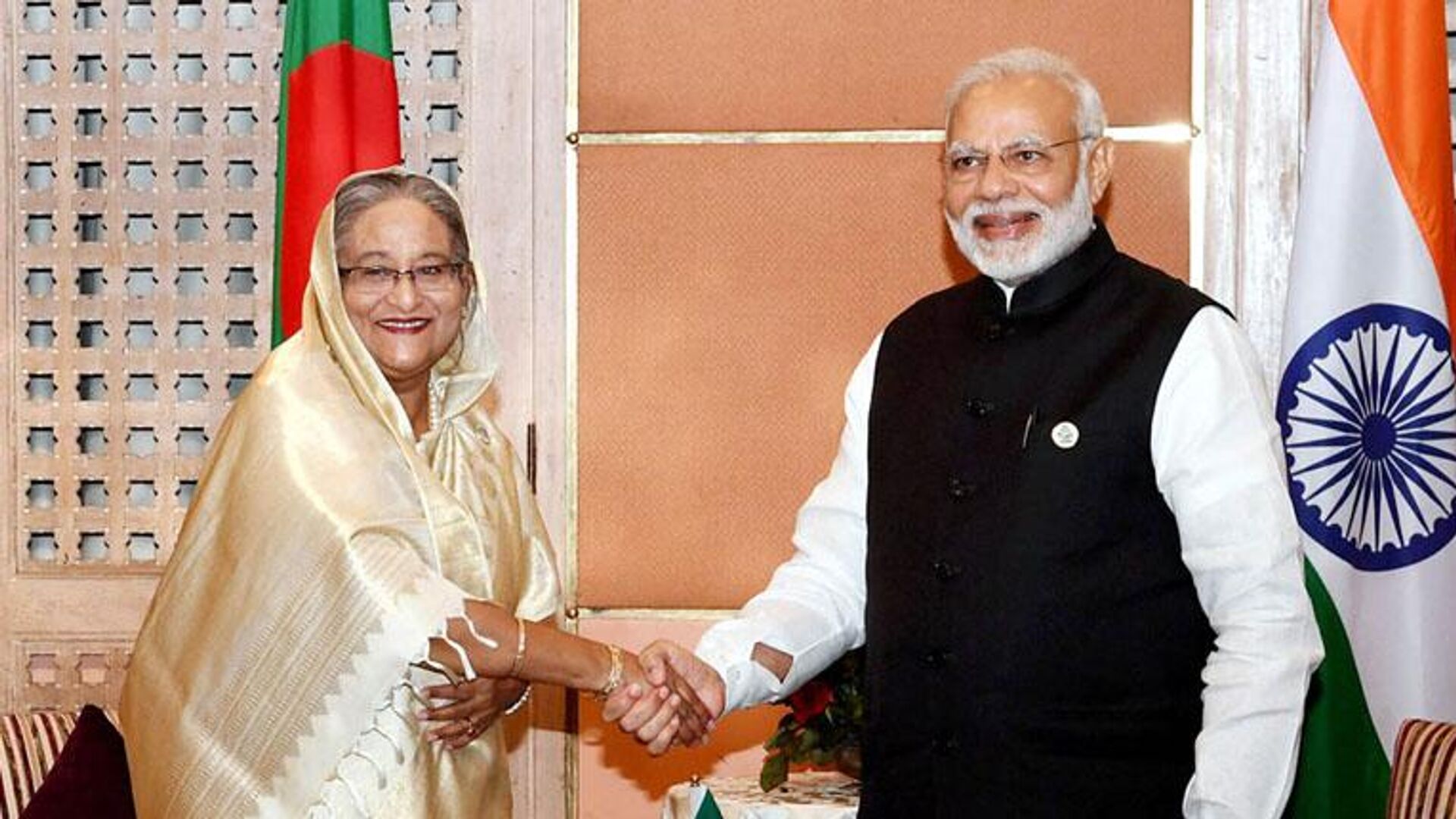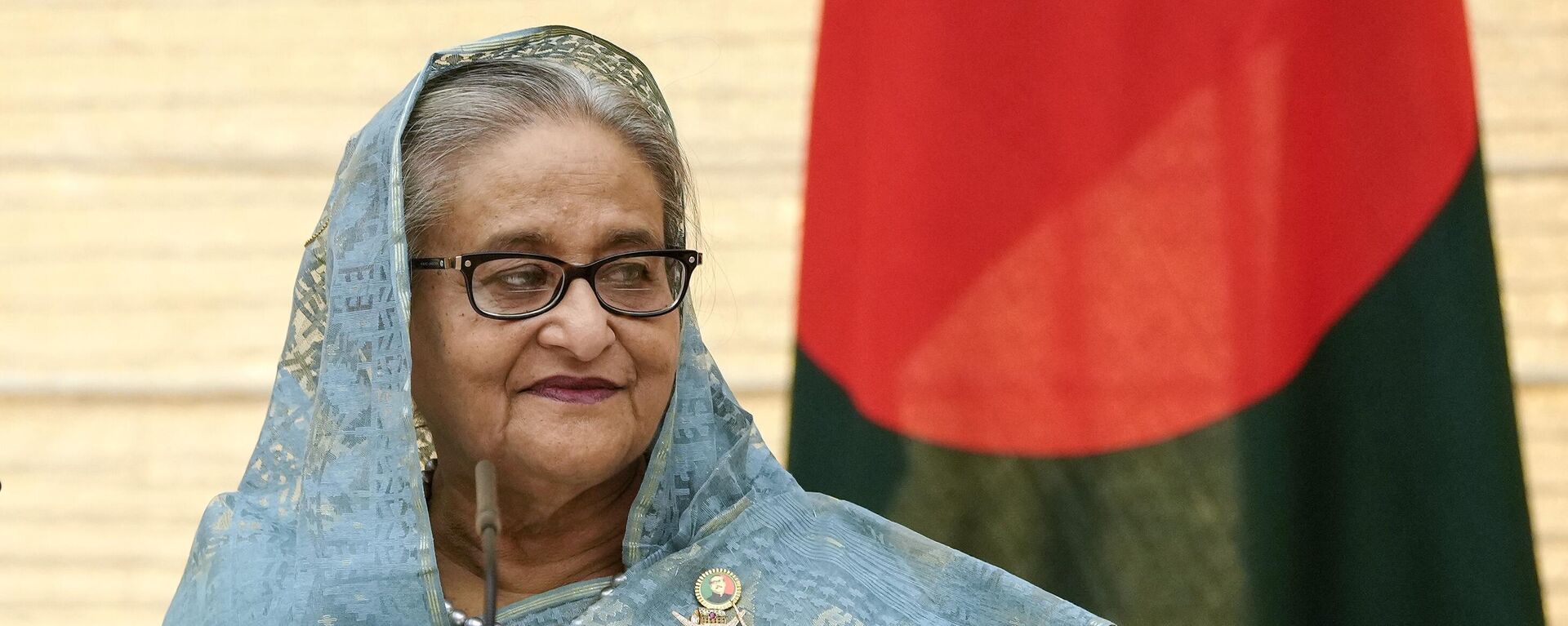https://sputniknews.in/20240801/bangladesh-seeks-strong-indian-support-to-ward-off-western-pressure-7947218.html
Bangladesh Seeks Strong Indian Support to Ward Off Western Pressure
Bangladesh Seeks Strong Indian Support to Ward Off Western Pressure
Sputnik India
India has sent a strong political signal to the West that it would continue to support Prime Minister Sheikh Hasina’s government in Dhaka, as the top Indian diplomat met the Bangladesh leader on Wednesday.
2024-08-01T17:51+0530
2024-08-01T17:51+0530
2024-08-02T14:00+0530
sheikh hasina
bangladesh
india
european union (eu)
bangladesh nationalist party
dhaka
us
us state department
western sanctions
sanctions
https://cdn1.img.sputniknews.in/img/07e8/07/03/7767733_0:0:764:430_1920x0_80_0_0_4404c61db34265e85bc07167f3260841.jpg
Bangladesh has pinned hope on “strong Indian support” in view of growing political pressure on Prime Minister Sheikh Hasina’s government from the Western countries, which are major trade partners and export destinations for Dhaka.She stressed that ties between New Delhi and Dhaka have been “deep-rooted” since the 1971 Liberation War.Further, Ahmed pointed to India’s concerns over the activities of Bangladesh Nationalist Party (BNP)-Jamaat-e-Islami (JI) the last time they were in power in the country between 2001 and 2006.Reportedly, the BNP government had facilitated the transfer of arms from the Chhatogram port for insurgent groups in India’s Northeastern states.Even during the recent student led protests, the BNP and JI cadre have targeted Hasina for expanding connectivity and economic ties with India, according to social media posts by the opposition parties. In fact, the BNP and its allies have been leading an ‘India Out’ campaign to boycott Indian imports.The Bangladesh government has squarely blamed BNP’s London-based Acting President Tarique Zia for “masterminding” the violence, which the government says left at least 150 people dead and caused damages to millions of dollars of government and private property.On Thursday, Bangladesh’s Home Ministry issued a notification banning Jamaat-e-Islami and its student wing Islami Chhatra Shibir for instigating violence during the quota protests.Meeting Between Hasina and Indian High CommissionerThe comments by the Awami League official came a day after Indian High Commissioner in Dhaka called on PM Hasina at her official residence, as reported by official news agency Bangladesh Sangbad Sangstha (BSS).During the meeting, Verma said that India would always support the Bangladeshi government and its people to realise the vision of a “progressive and prosperous Bangladesh”.Squadron Leader (Retd) Sadrul Ahmed Khan, a member of the Awami League's finance and planning affairs sub-committee, told Sputnik India that the meeting was a “political signal” by New Delhi to the global community.Polarisation Between India and West on BangladeshHasina has also met the Ambassadors of Germany, Spain, Japan and Norway in the last two weeks. The western partners have been viewed as being critical of Hasina government’s actions in quelling the quota protests.EU's Foreign Policy Chief Joseph Borell told Bangladesh's former Foreign Minister AK Abdul Momen on the margins of the recent ASEAN-mechanism meetings in Laos that there must be "full accountability" for the killings and violence during the protests, adding that Brussels would closely follow Dhaka's actions, according to an EU statement.Commenting on the differences between India and the West on Bangladesh, a veteran Indian diplomat and academic told Sputnik India that there was a “deep polarisation” on the respective outlooks towards the Hasina government.Muni said that the quota protests in Bangladesh have given the western countries a “new handle” to pressure the Hasina government on the issue of human rights.Bangladesh Involved in Hectic Efforts to Convey its PositionMeanwhile, Awami League’s Ahmed said that government as well as party officials have been involved in hectic efforts to convey Bangladesh’s position on the recent violence and vandalism during the student-led quota protests to foreign diplomats stationed in Dhaka.The ruling party official underscored that western countries were “important developmental and trade partners” of Dhaka, with the EU being a major destination for Bangladesh’s textile exports and accounting for nearly half of its overall exports.In the wake of protests, ratings agency S&P has downgraded its outlook for Bangladesh in view of depleting foreign exchange reserves, further affected by the nationwide curfew which crippled crucial sectors.He stated that the risk of the internal situation being “manipulated” by vested actors in western intelligence agencies was very real at this point.
https://sputniknews.in/20240725/in-a-first-bangladeshi-pm-speaks-on-us-role-in-fueling-student-protests-7911379.html
bangladesh
india
dhaka
us
south asia
indo-pacific
Sputnik India
feedback.hindi@sputniknews.com
+74956456601
MIA „Rossiya Segodnya“
2024
Dhairya Maheshwari
https://cdn1.img.sputniknews.in/img/07e6/0c/13/138962_0:0:641:640_100x100_80_0_0_2cb44360dbcdf6d84bf4b299cd045917.jpg
Dhairya Maheshwari
https://cdn1.img.sputniknews.in/img/07e6/0c/13/138962_0:0:641:640_100x100_80_0_0_2cb44360dbcdf6d84bf4b299cd045917.jpg
News
en_IN
Sputnik India
feedback.hindi@sputniknews.com
+74956456601
MIA „Rossiya Segodnya“
Sputnik India
feedback.hindi@sputniknews.com
+74956456601
MIA „Rossiya Segodnya“
Dhairya Maheshwari
https://cdn1.img.sputniknews.in/img/07e6/0c/13/138962_0:0:641:640_100x100_80_0_0_2cb44360dbcdf6d84bf4b299cd045917.jpg
student protests bangladesh, bangladesh news, bangladesh awami league, us regime change bangladesh, quota movement in bangladesh, quota system in bangladesh, quota protests, bangladesh protest news, bangladesh protest update, bangladesh textile industry, bangladesh garment exports
student protests bangladesh, bangladesh news, bangladesh awami league, us regime change bangladesh, quota movement in bangladesh, quota system in bangladesh, quota protests, bangladesh protest news, bangladesh protest update, bangladesh textile industry, bangladesh garment exports
Bangladesh Seeks Strong Indian Support to Ward Off Western Pressure
17:51 01.08.2024 (Updated: 14:00 02.08.2024) India has sent a strong political signal to the West that it would continue to support Prime Minister Sheikh Hasina’s government in Dhaka, as the top Indian diplomat met the Bangladesh leader on Wednesday.
Bangladesh has pinned hope on “strong Indian support” in view of growing political pressure on Prime Minister Sheikh Hasina’s government from the Western countries, which are major trade partners and export destinations for Dhaka.
“We want India to play a strong role in ensuring regional stability. India should support not only Bangladesh, but the entire South Asian region,” Shammi Ahmed, the International Affairs Secretary of Awami League, told Sputnik India on Thursday.
She stressed that ties between New Delhi and Dhaka have been “deep-rooted” since the 1971 Liberation War.
“It is not that India supports any particular party in Bangladesh, our relations are rather deep-rooted and between the people of both the countries,” the Awami League official remarked.
Further, Ahmed pointed to
India’s concerns over the activities of Bangladesh Nationalist Party (BNP)-Jamaat-e-Islami (JI) the last time they were in power in the country between 2001 and 2006.
“We, in the Awami League, have ensured that our territory never gets used to fuel terrorism and militancy in the neighbourhood,” she stated.
Reportedly, the BNP government had facilitated the transfer of arms from the Chhatogram port for insurgent groups in India’s Northeastern states.
Even during the recent student led protests, the BNP and JI cadre have targeted Hasina for expanding connectivity and economic ties with India, according to social media posts by the opposition parties. In fact, the BNP and its allies have been leading an ‘India Out’ campaign to boycott Indian imports.
The Bangladesh government has
squarely blamed BNP’s London-based Acting President Tarique Zia for “masterminding” the violence, which the government says left at least
150 people dead and caused damages to millions of dollars of government and private property.
On Thursday, Bangladesh’s Home Ministry issued a notification banning Jamaat-e-Islami and its student wing Islami Chhatra Shibir for instigating violence during the quota protests.
Meeting Between Hasina and Indian High Commissioner
The comments by the Awami League official came a day after Indian High Commissioner in Dhaka called on PM Hasina at her official residence, as reported by official news agency Bangladesh Sangbad Sangstha (BSS).
During the meeting, Verma said that India would
always support the Bangladeshi government and its people to realise the vision of a “progressive and prosperous Bangladesh”.
Squadron Leader (Retd) Sadrul Ahmed Khan, a member of the Awami League's finance and planning affairs sub-committee, told Sputnik India that the meeting was a “political signal” by New Delhi to the global community.
“Bharat and Bangladesh are true friends, trusted neighbours and regional partners. People to people contact between both the countries are intense. Bharat is always there to stand for Bangladeshi people, be it natural disaster like Covid-19 pandemic, Cyclone Sidr or a man-made crisis like the present one. At this point, the Indian High Commissioner met HPM Sheikh Hasina which is a political signal that India will always support policies and endeavours to realize a stable, progressive and prosperous Bangladesh,” Khan stressed.
Polarisation Between India and West on Bangladesh
Hasina has also met the Ambassadors of Germany, Spain, Japan and Norway in the last two weeks. The western partners have been viewed as being critical of Hasina government’s actions in quelling the quota protests.
EU's Foreign Policy Chief Joseph Borell told Bangladesh's former Foreign Minister AK Abdul Momen on the margins of the recent ASEAN-mechanism meetings in Laos that there must be "full accountability" for the killings and violence during the protests, adding that Brussels would closely follow Dhaka's actions, according to an EU statement.
Commenting on the differences between India and the West on Bangladesh, a veteran Indian diplomat and academic told Sputnik India that there was a
“deep polarisation” on the respective outlooks towards the Hasina government.
“There is a deep polarisation between India and the West in terms of the situation in Bangladesh, which is not a new development. The western countries are not in favour of Hasina, and it is entirely due to India's insistence that they went along in supporting the Hasina government,” explained SD Muni, a former Indian Special Envoy Professor Emeritus at New Delhi’s Jawaharlal Nehru University (JNU).
Muni said that the quota protests in Bangladesh have given the western countries a “new handle” to pressure the Hasina government on the issue of human rights.
“While India has, to an extent, been able manage the US policy towards the Hasina, it will find it difficult to manage the EU,” stated Muni.
Bangladesh Involved in Hectic Efforts to Convey its Position
Meanwhile, Awami League’s Ahmed said that government as well as party officials have been involved in hectic efforts to convey Bangladesh’s position on the recent violence and vandalism during the student-led quota protests to foreign diplomats stationed in Dhaka.
“Their initial reaction was of shock. The Western diplomats have expressed their concern, but they have their own limitations in terms of influence on the foreign policy of their respective governments,” stated Ahmed.
The ruling party official underscored that western countries were “important developmental and trade partners” of Dhaka, with the EU being a major destination for
Bangladesh’s textile exports and accounting for nearly half of its overall exports.
In the wake of protests, ratings agency S&P has downgraded its outlook for Bangladesh in view of depleting foreign exchange reserves, further affected by the nationwide curfew which crippled crucial sectors.
On the other hand, Khan warned that western criticism of Hasina’s policies could also tantamount to “political interference”.
He stated that the risk of the internal situation being “manipulated” by vested actors in western intelligence agencies was very real at this point.
“While it's essential to address legitimate grievances, it's equally important to understand the broader aspect of geopolitical context and the potential consequences of prolonged protests,” Khan concluded.



